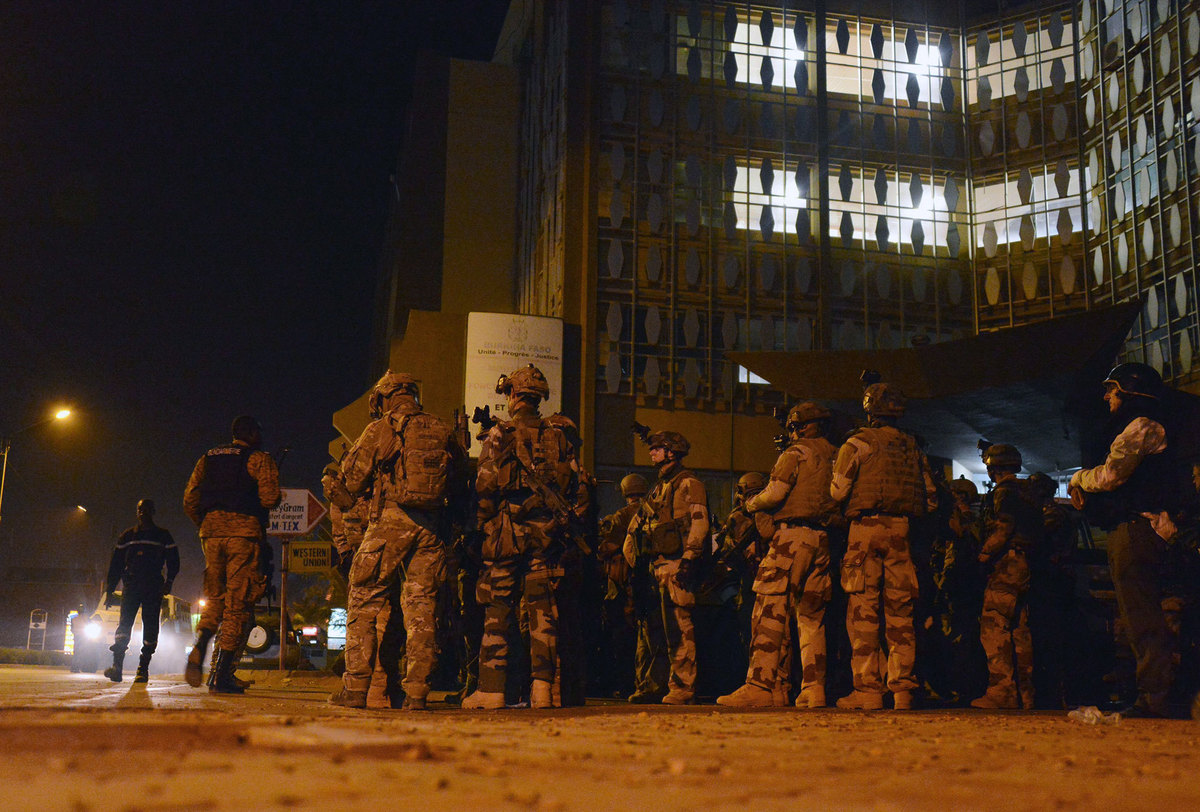An attack by al-Qaeda militants at a hotel in the West African nation of Burkina Faso left at least 23 people dead and highlighted the militants’ shift to striking capital cities in the region.
Burkina Faso’s military rescued at least 126 hostages from the Splendid Hotel, which is popular with foreigners, on Saturday after the siege. It was the second attack claimed by al-Qaeda since gunmen took more than 100 people hostage in November at the Radisson Blu hotel in the capital of neighboring Mali, killing dozens.
French special forces helped Burkina Faso’s army in the operation, Interior Minister Simon Compaore said by phone. Among the victims were people from 18 countries. Four of the militants, including two women, are dead, Army spokesman Guy-Herve Ye said. Al-Qaeda in the Islamic Maghreb, led by the one-eyed former Algerian soldier Mokhtar Belmokhtar, said it carried out the siege that began on Friday at about 7 p.m. local time.
War Expands
The attack showed al-Qaeda’s growing ability to strike far from its traditional field of operations in northern Mali where it’s been fighting government troops, French soldiers and United Nations peacekeepers, backed by U.S. intelligence officials and special forces. President Francois Hollande has sent soldiers and fighter planes to former French colonies in Africa to repel the Islamists, whose attacks intensified in the semi-arid Sahel region with arms looted from Libya following the collapse of Muammar Qaddafi’s government in 2011.
“I think it’s just a matter of time, whether it’s in Abidjan, Accra, or Dakar,” Cynthia Ohayon, Burkina Faso analyst for the Brussels-based International Crisis Group, said by phone from Ouagadougou. “It happens in Paris and in Istanbul; it can happen anywhere.”
Roger Nikiema, a Burkinabe who was meeting friends at the Cafe Cappuccino in Ouagadougou, said they had just placed their order when the gunfire started.
“We all threw ourselves on the floor,” he said in an interview. “I was with six friends, three American girls and three guys. A bullet hit my arm and I have an injury there. I heard a female voice among the attackers.”
French Intervention
The latest attack came a day after al-Qaeda-linked militants in Somalia claimed to have killed 63 Kenyan soldiers in the southwest of the Horn of Africa country and two days after Islamic State said it carried out a gun-and-suicide bomb assault in central Jakarta, Indonesia.
As they did when they attacked the Radisson Blu in Mali, the militants said their latest raid was done in response to French intervention in the region that has led to the death of Muslims, according to a statement it sent to Mauritania’s al-Akhbar newspaper on Friday. AQIM disavowed Islamic State last week, saying the group’s caliphate in Syria is illegal and strays from the tenets of Islam.
“We killed 30 of the crusaders,” one of the attackers in Ouagadougou said in a recorded message sent to the newspaper. Al-Qaeda “will fight against France until the last drop of blood.”
AQIM and other militant groups stepped up their advance in northern Mali, a desolate, semi-arid area, after a coup by the army in 2012 created a power vacuum.
From its start in 2013, France’s military drive against the Islamists has expanded to almost 3,000 troops fighting militants from Mali to Niger and Chad, where the Nigerian group Boko Haram is active. AQIM’s Belmokhtar is believed responsible for the 2013 attack on a BP Plc plant in Algeria that left 38 dead.
Government officials in the region say militants and traffickers compete with each other to move drugs, goods and migrants through the Sahel and the Sahara, which is hard to patrol because of its desert-like temperatures and lack of roads.
Political Instability
Burkina Faso, Africa’s fourth-largest gold producer, has faced political instability in recent years. Formerly known as the Republic of Upper Volta, President Blaise Compaore was ousted in October 2014 after 27 years in power following widespread public demonstrations against him. A failed coup followed in September, and in November elections, Roch Marc Christian Kabore was voted into the presidency.
“The new government was appointed three days ago; the president took office two weeks ago,” said Ohayon of International Crisis Group. “There was a wave of optimism and this attack has dealt a huge blow to that. Burkina Faso serves as a symbol of progress in the region, because it’s an example of democratic consolidation and peaceful religious coexistence — and I think that’s what they want to destroy.”


 Forex2 weeks ago
Forex2 weeks ago


 Naira1 week ago
Naira1 week ago
 Naira4 weeks ago
Naira4 weeks ago
 Company News4 weeks ago
Company News4 weeks ago
 Billionaire Watch1 week ago
Billionaire Watch1 week ago




 Naira2 weeks ago
Naira2 weeks ago




 Naira3 weeks ago
Naira3 weeks ago




 Naira1 week ago
Naira1 week ago




















